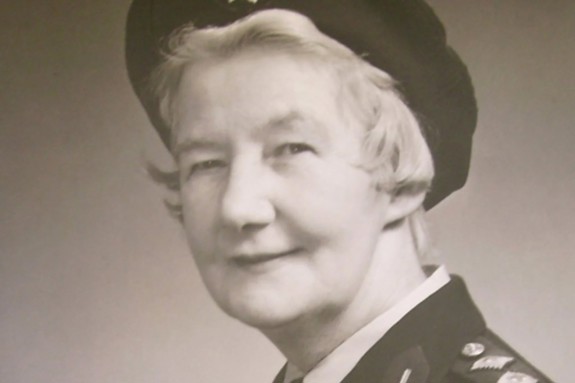A woman of great perseverance
“I’m afraid that I didn’t obey orders that day”. Recalling her decision to ignore the order to return home, and instead choosing to join the fighting during the Easter Rising, Leslie Bean de Barra offers us a glimpse into the character of the woman who would go on to become Director of Cumann na mBán and chairperson and President of the Irish Red Cross, leaving behind her an impressive legacy at both a national and international level.

Leslie Bean de Barra (neé Price) was born in Dublin in 1893. De Barra’s legacy is one of rebellion and leadership and her partnership with General Tom Barry, the leader of the IRA’s flying column in West Cork, is fitting as the pair married in 1921. As de Barra played a role in the 1916 Rising and the War of Independence, many people will think of her only in this context. In remembering the legacy of such an important woman, however, her work and time with the Irish Red Cross is something to be celebrated.
De Barra’s work in the Irish Red Cross began with the inception of the Society in 1939, and paving her way through the ranks in leadership roles, she was subsequently nominated as Irish Red Cross chairperson in August 1950. De Barra was then reappointed as chairperson of the Society in 1953 and stayed in this position for more than two decades.
De Barra did not conform with many of the gendered stereotypes that were prevalent in mid-twentieth century Ireland and instead dedicated her time to championing important causes for vulnerable people while maintaining a position of leadership and power.
”Women are a bit of a drag on men who are fighting”
Interestingly, de Barra expressed opinions that seemed at odds with her own actions. Speaking of her experiences during the Rising, she said “women, especially married women are a bit of a drag on men who are fighting. I noticed it particularly in the North King Street area … there were a couple of young married women on duty and their husbands were in the same area.” Describing her annoyance with these women, who arrived on scene during the action asking after their husband’s whereabouts, de Barra remembered that she had thought at the time “the three of you, it would be good for you to clear off”.
This no-nonsense attitude deployed by de Barra appears to have filtered right down into her leadership in the National Society and while on one hand critical of her fellow female comrades, it is worth noting women were afforded the same rank as men in the Irish Citizen Army and can understand de Barra here to be exercising her desire to get the job done at hand, with no distractions interrupting her - or her fellow comrades.
De Barra worked tirelessly to champion the values of the Red Cross and was particularly insistent on the role of the Irish Red Cross as an auxiliary to the armed forces during conflict and maintaining its independence, one of the core principles to the movement. De Barra worked to ensure that the Department of Defence agreed that the Society could wear the Red Cross uniform and act as an auxiliary to the medical services of the armed forces during conflict.
Another commendable achievement of the Irish Red Cross, with de Barra at its helm, was the establishment of services to address the needs of the elderly community in Ireland. In the absence of any state geriatric policy or funding, dialogue was initiated with the Irish government and the designation of the title “Our Old People’s Year” for 1965 was also introduced by the Irish Red Cross. This provided much needed recognition for the older community.
In the 1950’s de Barra’s Red Cross team had the responsibility for the refugees coming to Ireland. This was by no means an easy feat as the Irish economy was facing great difficulties and the climate was hard. But her refusal to ignore the plight of those fleeing their home countries in search of safety is something which the Irish Red Cross reflects on with pride. That de Barra could foster and encourage this sentiment within Irish society is a great achievement – and it is a sentiment which is now more than ever important to keep within the public discourse.
In 1978 De Barra was honoured with the Henry Dunant medal for her contribution to the Red Cross movement. She passed away in April 1984. Today she is remembered in the Leslie Bean de Barra Trophy, an award that acknowledges the commitment of informal carers at home and in the community, a fitting legacy in Leslie Bean de Barra’s name.
Leslie Bean de Barra
Irish Red Cross
